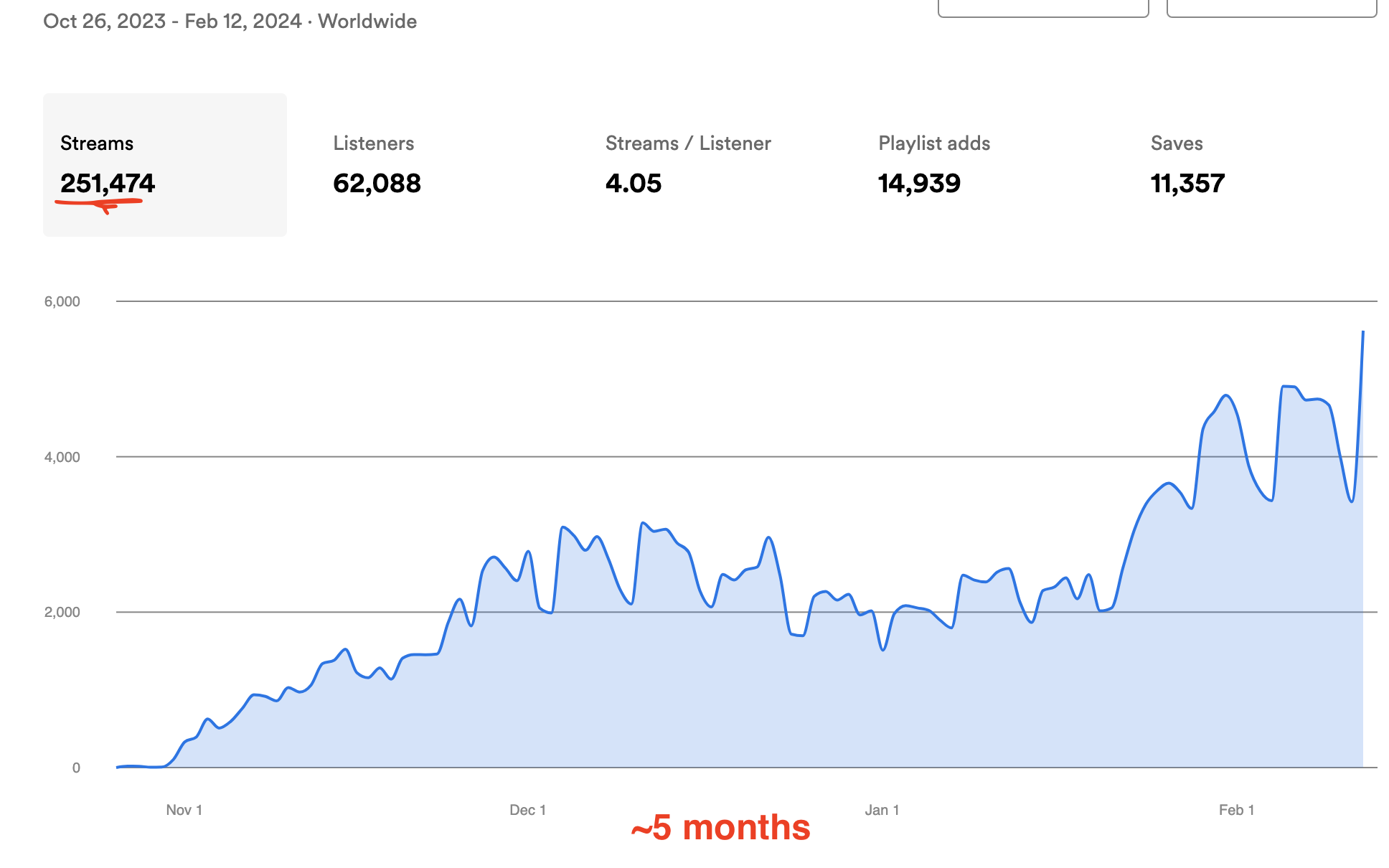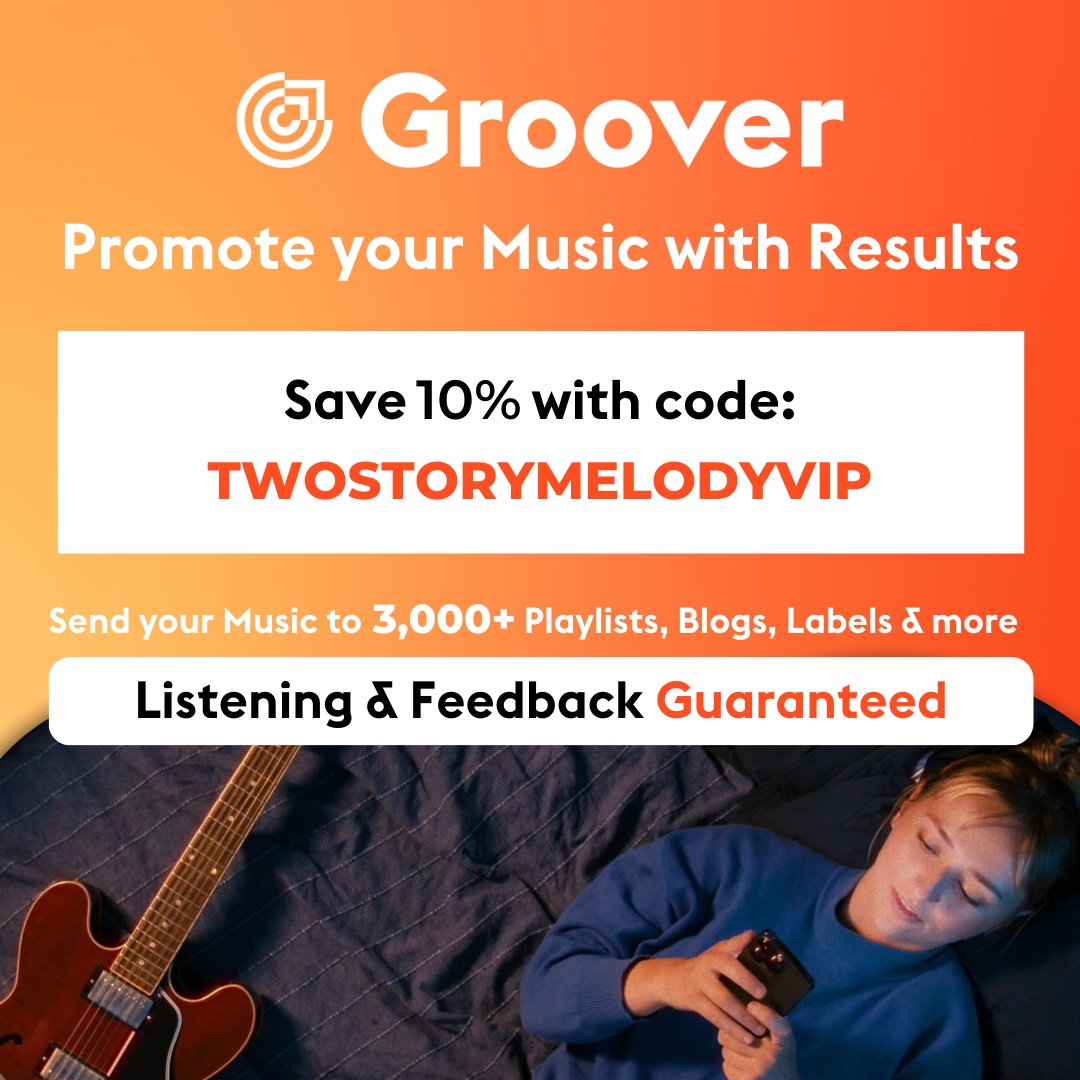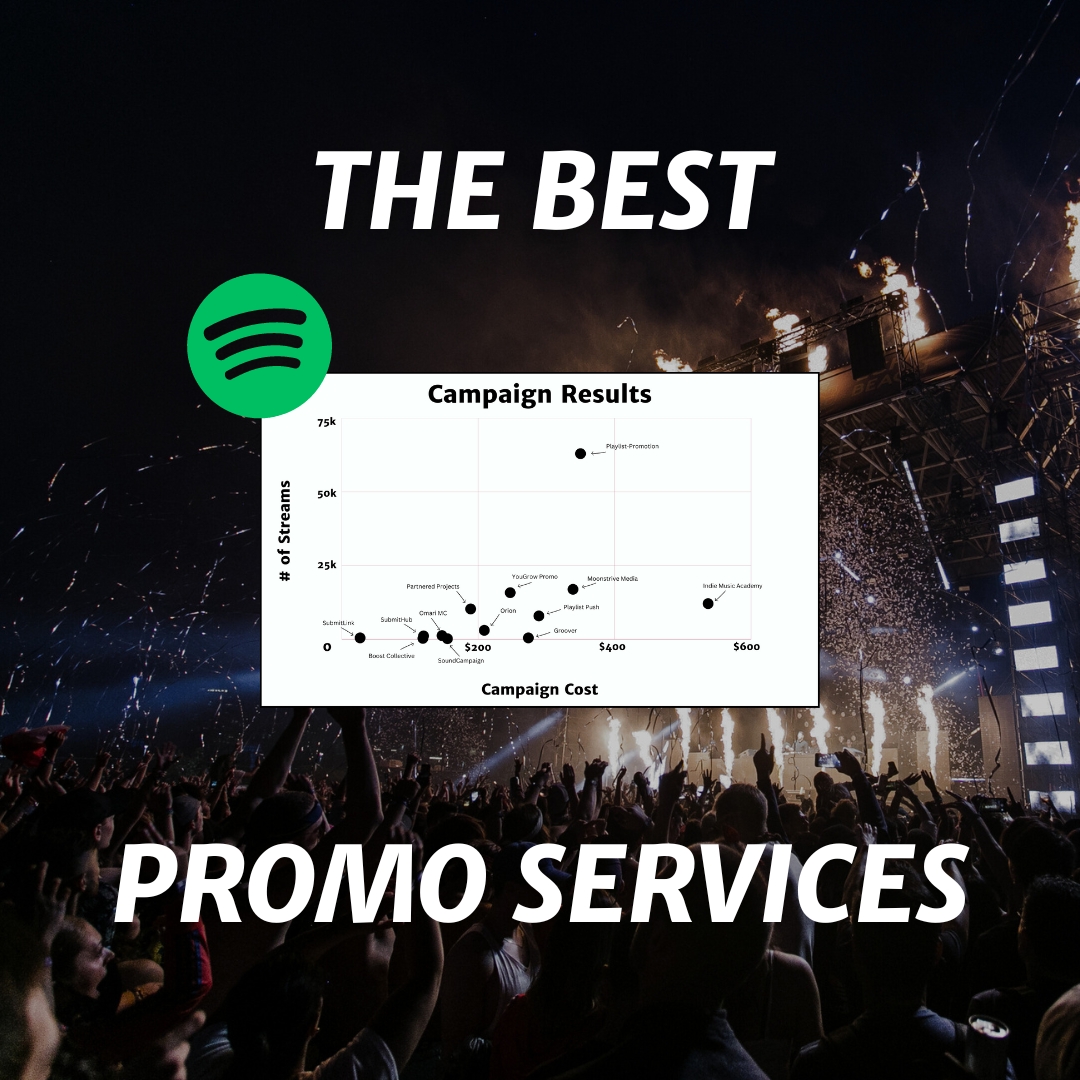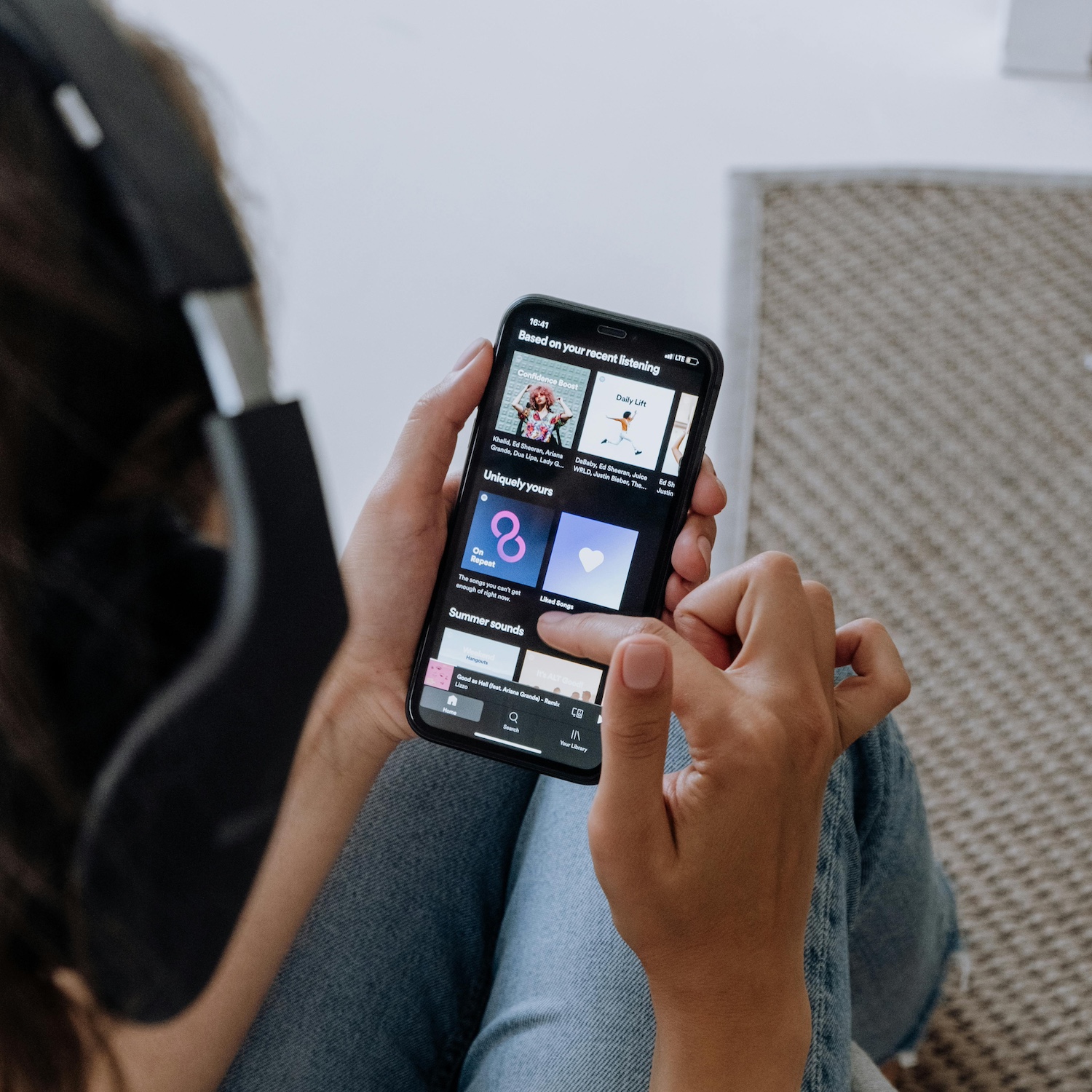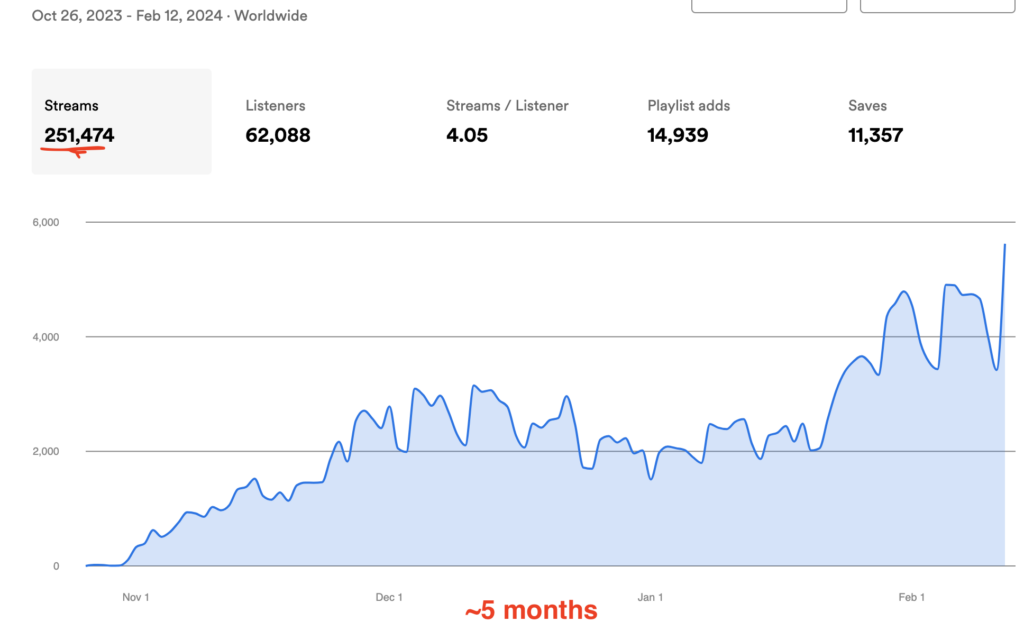I take it, by the fact that you’ve found this page, that you’re looking for music promotion. It’s a tough search, right?
Maybe you’ve been cruising that r/musicmarketing thread on reddit, trying to figure out who actually knows what they’re talking about. Maybe you’ve been reading posts about playlisting services (like my own controversial list), doing your best to read between the lines so you can figure out if it’s all a scam. Truthfully, there’s a lot of information out there, and most of it’s not all that much help. I’m sorry.
With that in mind, I’ll try to cut to the chase here:
In my opinion, based on multiple real campaigns, YouGrow Promo – and, more specifically, their Spotify service – is legit.
I’ve run multiple campaigns with YouGrow. I don’t think that YouGrow’s service (or playlisting in general) is necessarily the best way on earth to grow on Spotify. My opinion is that playlisting is a tool in the toolbox, and that it works best paired with a lower-risk, more highly targeted strategy, like Meta ads. (On that note, here is a shameless plug for my own Meta ads service.)
But with all that said, I do think that:
- YouGrow has a solid network of playlists, with followings populated by real people and not bots.
- YouGrow’s customer support is responsive and helpful (and also I personally know and like several people at the company)
- YouGrow delivers on their promises to get real streams, and they do so with pretty impressive cost-efficiency. There are very few more affordable options for legitimately raising your stream counts.
It’s not all roses, as I’ll detail below (I’m going to walk through my most recent campaign experience and unpack both the pros and cons). But these guys are a solid company.
With all of that said, as you might guess, I am an affiliate with them. If you want to give their Spotify promotion a shot, you can try YouGrow here.
And if you want more details on my campaigns with them before you purchase – well, that’s probably a smart call. Here’s the video version:
Over the rest of this post, I’ll break down things down even further. Keep reading and let’s get into it.
My background with YouGrow Promo
I always like to disclose the context for my reviews; it feels like it makes things transparent, and my hope is that it helps you to file my opinion into a proper spot in your head. But I also realize that some of you could care less about my background and just want to get into the campaign results.
If that’s you, just hit this link.
Okay, if you’re still here, here’s the sitch:
A couple of years ago, YouGrow reached out to me via the contact form on my website and asked if I’d be interested in becoming an affiliate with their company. I get a lot of inquiries like this (because my post on Spotify companies gets a decent bit of traffic), and if the company looks respectable to me, I’ll usually respond and ask to try their services.
Here’s how my exchange went:
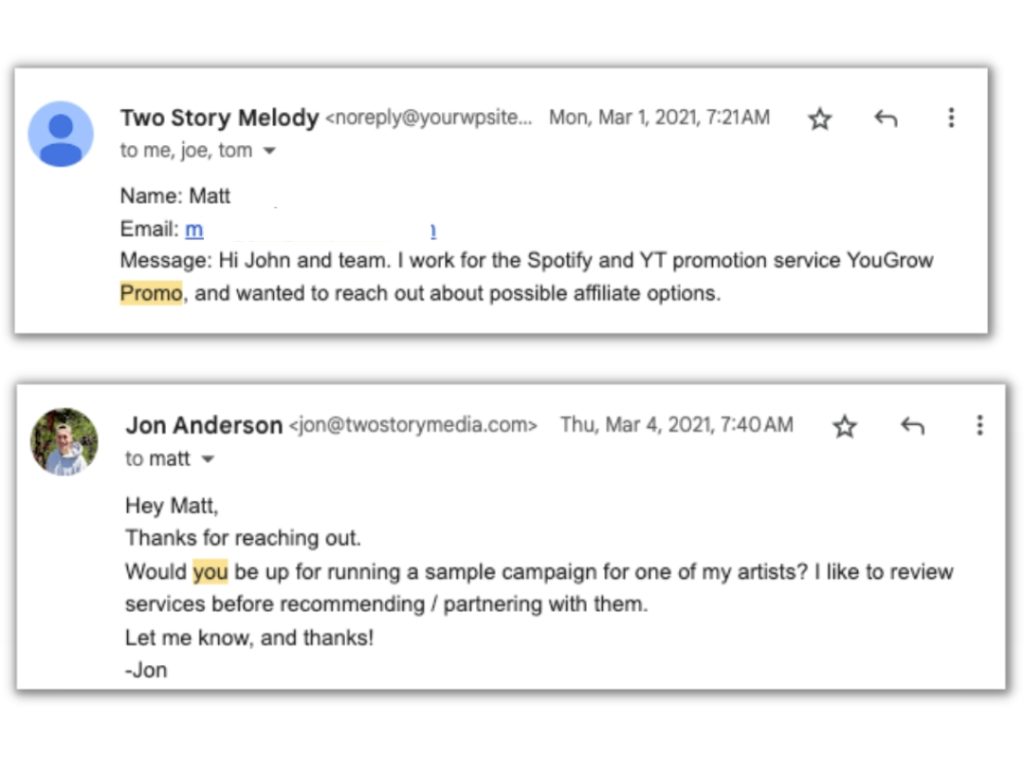
We ended up running a campaign for one of my clients at the time, and it went pretty well. All told, we got about 10,000 streams for a campaign that was priced at $117 (although they ran it for free).
That’s super cost-efficient, in case you’re wondering.
Based on everything we could see, the streams were legitimate (although not all of the lists were as targeted as I would’ve liked). Still, the performance was good enough that I added YouGrow to my list of the top Spotify promotion companies, and continued the relationship with more campaigns. More recently, I wrote a full review of a TikTok influencer campaign I ran with them; my takeaway was ultimately that influencer campaigns aren’t super impactful for long-term social growth, but that the company itself did a fine job and delivered on its promises. You can read all about that here.
This year, I’ve been in the midst of re-trying a bunch of Spotify promotion companies so that I can update my list with accurate and up-to-date data. As part of that, I decided to give YouGrow’s Spotify promotion another spin, and this time, I made up my mind to write a full review of it.
And that’s where we are today.
My YouGrow Spotify promotion: the song and the setup
After I decided to re-try a bunch of Spotify promotion services, I emailed my list to ask for volunteers (long story, but this was probably not the smartest thing I’ve ever done ha). One of the respondents was Lew Apollo.
Lew makes some pretty awesome soul-pop.
I’m not sure how he’ll feel about this, but it kind of reminds me of X Ambassadors – blues-reminiscent heart, catchy melodies, good pop production. Anyway, I thought it’d be a good fit for playlisting, so we went back and forth and I decided to run with his track “TROUBLE ON MY MIND”.
This time, rather than coordinating with a YouGrow team member before placing the campaign, I just submitted through their order form so that I’d get the normal customer experience. I went with the “Rising Artist” package, which promised between 10,000 and 22,000 streams and cost $217.
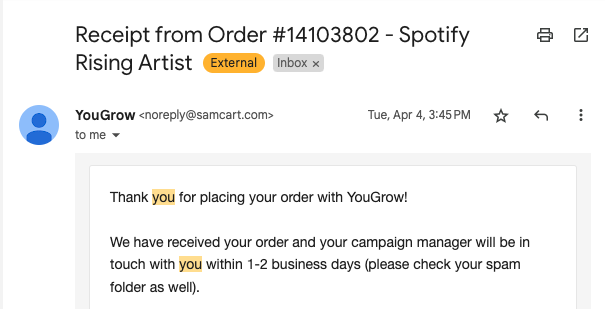
Sure enough, within the next couple of days, I heard directly from Ethan at YouGrow (who I don’t know personally), letting me know that he’d be my campaign manager and that our song had been sent out to curators. Interestingly, Ethan also told me that there was a chance we’d only get added to one playlist if it had enough active listeners to complete our campaign.
After we’d waited for a few days without results, Ethan proactively followed up again to let me know he was still working on things.
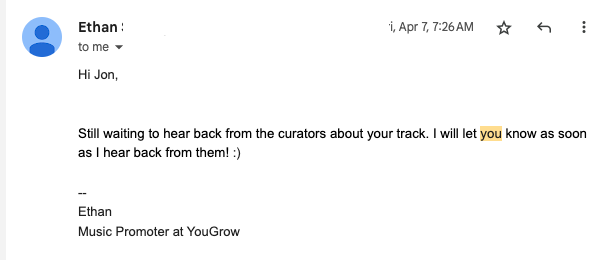
Finally, exactly a week after I’d submitted the order, Ethan reached out to let me know that we’d been placed in a couple of playlists.
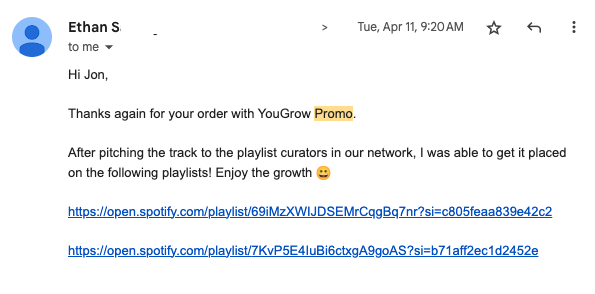
And that was that. From there, we watched the streams come in.
The results from the YouGrow Spotify campaign
Overall, I’d say that YouGrow’s results were pretty solid. Two placements obviously isn’t a ton, but both of them were on active and seemingly healthy lists. Here are the lists, in case you want to check them out. You’ll see that they both have a ton of followers (and, to be fair, a ton of songs).
And here’s what both of their follower growth curves look like:
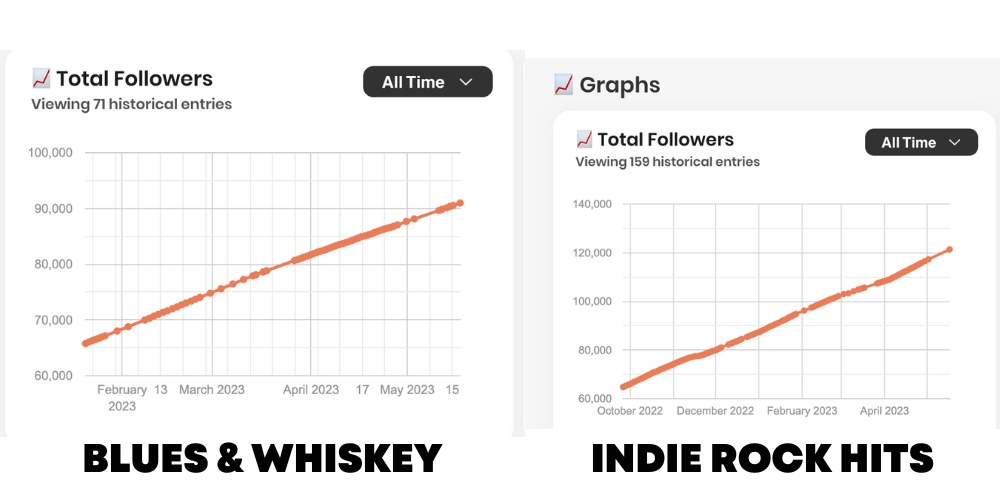
Finally, it’s worth noting that both of these lists perform well in Spotify’s search results, which is a sign that the platform thinks they’re legit.
For example, here’s the Blues & Whiskey list showing up for “blues” on a results page that, besides this list, only features Spotify’s own editorial playlists:
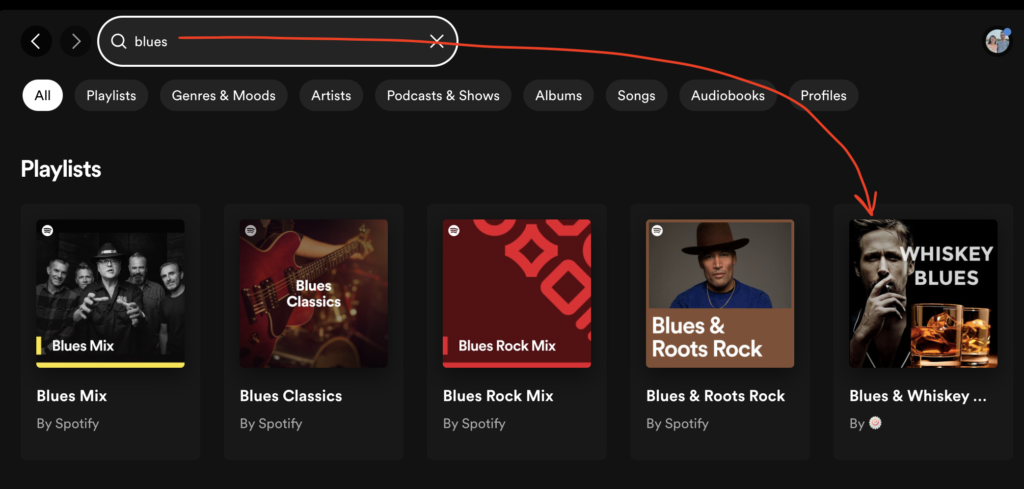
I found that fairly impressive, actually.
The takeaway from all of that is that, on the front side, these lists look good.
And on the Spotify for Artists side, things look pretty good, too. Both of these lists have driven a bunch of streams, with the Blues & Whiskey list accounting for the most streams of any playlist on which “TROUBLE ON MY MIND” has been placed.
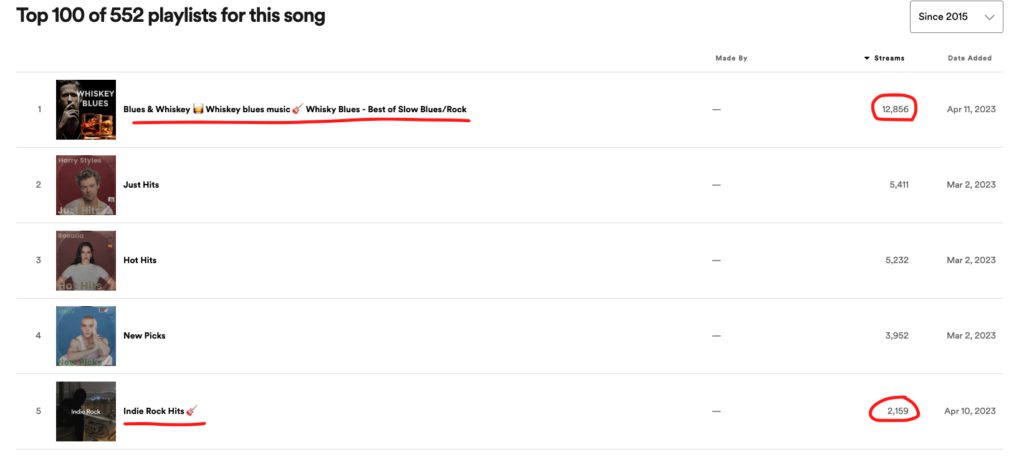
Overall, the track is currently sitting at around 55,000 streams. It’s difficult to parse exactly how the two YouGrow lists affected that total, because as you can see from this image, Lew has run other playlisting campaigns. Also, it’s hard to determine cause and effect with algorithmic streams and personal playlist adds.
I can say that the song hasn’t “triggered the algorithm” in a huge way – which typically means getting picked up by Discover Weekly – but it has gotten a little bump from Radio, and overall streams have been fairly steady since the end of the YouGrow campaign.
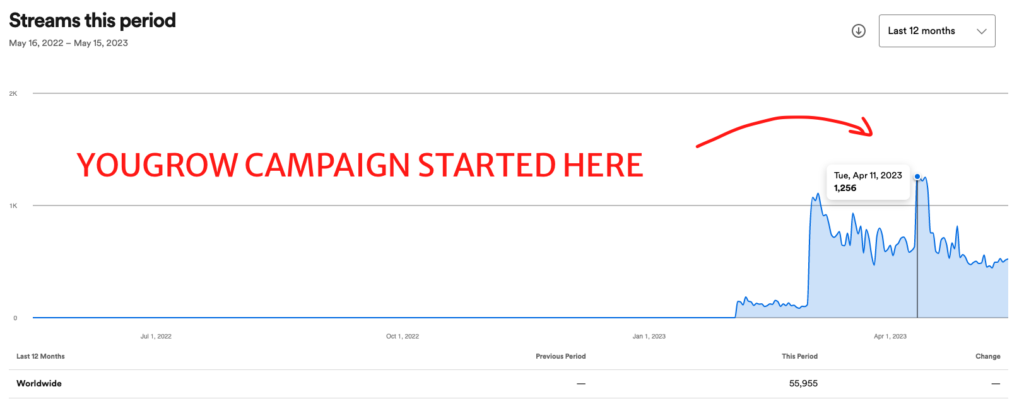
Again, while an exact count is tough to determine, it’s clear that the campaign has driven about 15,000 streams between those two placements.
(And, to be fair, it’s probably driven a few more than that through radio and personal saves.)
So, those were the results. I’ll unpack them in a little bit more detail below, along with some overall benefits and drawbacks to YouGrow’s approach.
The drawbacks of using YouGrow
Let’s start with the cons, first. To my eyes, there are really only two, and they’re kind of related.
1. Many of the streams were from Brazil and Mexico.
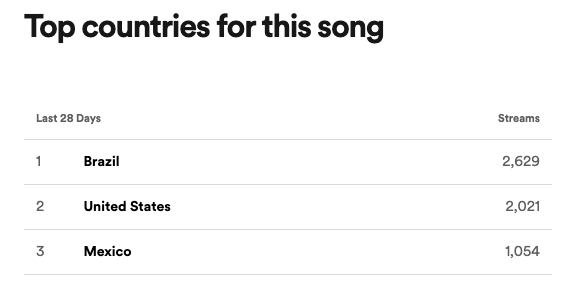
Honestly, this isn’t surprising; Brazil and Mexico are a) legitimate population centers for Spotify listeners, and b) cost-efficient targets for Facebook ads. In other words, if you’re growing a playlist with advertising spend, you’ll often bend toward these countries; I’ve done it myself running Facebook ads campaigns, and there’s nothing inherently wrong with it. Actually, if you’re cool with building an international fanbase, I think it kind of makes sense.
But if you’re not looking to build a fanbase in Brazil and Mexico, or if you’re looking for streams in a more targeted geographic location, then these streams probably aren’t super helpful.
2. The two playlists aren’t super-targeted fits.
Neither list is off-base, really. Lew describes his own music as blues, rock, and neo-soul, so you can see how the song kind of fits on a playlist with “Blues” or “Rock” in its title.
But also, neither of these lists is hyper-targeted toward the song; at best, it’s a general sort of fit, not a match to a specific mood.
My point with this is that the streams from these placements probably fall into some sort of middle ground; I’d dispute the idea that they’re generating “bad data,” but I’d be hesitant to say that they’re driving awesome data, too. The truth is probably somewhere in the middle, which is why we’re seeing some long-tail streams but no algorithm trigger point.
These two drawbacks could be summarized like this:
Most playlisting campaigns don’t drive highly engaged streams.
That’s not really YouGrow’s fault; it’s just the nature of playlisting. Playlists – even when they’re super targeted – are usually listened to as kind of background music. I’m a strong believer that playlists have a place; Spotify’s platform is built on playlists, and they can drive very cost-efficient streams. But their place is not typically to generate high levels of engagement (which is why I recommend pairing them with Facebook ads, if you can).
The benefits of using YouGrow
Okay, let’s end with some of the good news.
1. These are legitimate streams.
Hopefully I’ve made that clear by this point, but in case you’ve skimmed down here, I figured I’d reiterate the point.
2. These are very cost-efficient streams.
I’ll be updating my list post with more exact data, but for now, you’ll have to take my word for it: On a cost-per-stream basis, this campaign was one of the best out of the 15 I ran. It resulted in over 15,000 streams for a cost of $217 – which comes out to about $0.014 per stream. You’re still losing money at that point (because Spotify pays even less ha), but that’s actually pretty darn good.
3. YouGrow is easy to work with.
I really appreciated Ethan’s proactiveness in letting us know how the campaign was going – at no point did I feel ghosted or wonder what was going on.
(Also, I just saw that they released a portal, so it looks like in the future, you’ll be able to track campaigns in a sort of dashboard. Kind of cool.)
On the easy-to-work-with note, I wanted to mention that YouGrow also promises a guarantee: If they can’t work with your track or deliver on the promised number of streams, you’ll get a 100% refund.

For a company that accepts payment upfront (before reviewing your song), some sort of guarantee is necessary. But the fact that they’ll fully refund you if they can’t get all of your streams is a pretty good deal; most companies offer partial refunds for the services they render.
Final thoughts on YouGrow’s Spotify promotion
Overall, my verdict is that these guys are legit. They’re easy to work with, and they’re one of the most cost-efficient means toward Spotify streams. Based on the multiple campaigns I’ve run with them, the playlists they work with are healthy and active.
Playlisting always carries some risk, because even if you get on a healthy list with real listeners, there’s no guarantee your song will get high engagement. But I think YouGrow is as safe a company to try as any other – and when things go right, the results can be impressive (and a bunch of fun, too).
If you want to give YouGrow a try, here’s the link one more time.
And one last thought: Whether you try Spotify promotion or not, here’s hoping that you feel encouraged to keep making your music and putting it into the world. Remember, the point isn’t to get big numbers next to your songs on Spotify; the point is to connect with real people around meaningful music.
Here’s wishing you good luck.


